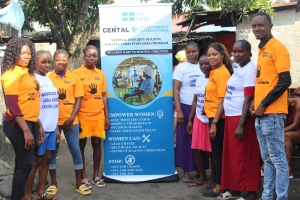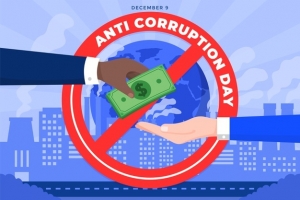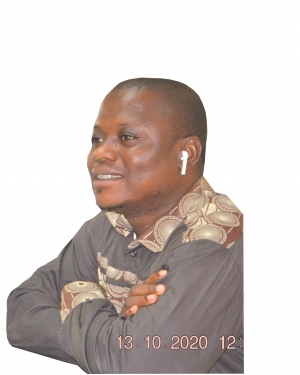Displaying items by tag: Corruption
“Women, O Women!’: In celebration of the International Women’s Day 2022
‘Women, O Women!’ It's the rallying cry of Liberia’s women movement. The cry summons a spirit that emboldens against the timidity that has held many women from venturing on new frontiers. It is a call that awakens women who have grown content with mediocrity and charges them to ‘do something’. It reminds of the inherent qualities that women possess and can employ to be even better. In a proper sense, however, it is a call to battle—a battle against all forms of suppression fostered by a male-dominated society. The struggle aims for a society where women have the opportunity to become productive professionals and not just consigned to the care economy; where customs do not subtract from the bodily integrity of women, and where having a female President is not just an isolated accomplishment. As we celebrate International Women’s Day today, it is important to reflect on the conditions of Liberian women and their pursuit of a more equitable society where governance without meaningful representation and participation of women is only a thing of the past.
In the shadows
Women have not always occupied prominent roles in Liberian society, and their voices have not always been publicly heard. In order to appreciate the early experiences of Liberian women, however, an assumption of homogeneity must not be made. While findings may vary due to ethnic, religious, and other considerations, a broader examination of women in the Liberian state must consider two groups that generally constituted the state: Americo-Liberians and Natives. Scholars are in agreement that a key commonality between the groups lie in the fact that women were not equal with men. Also, women were the dominant force in domestic work and child-rearing. However, Americo-Liberian women enjoyed some of the most progressive rights enjoyed by women across the world at the time. According to Newman, they could buy and sell land, enter into contracts, bring legal suits and initiate divorces, appeal to the Legislature, and exercise other forms of agency. [1]
In contrast, women in the customary or native setting were lacking in autonomy. According to Fuest, women were married off very young to older men, children belonged to the lineage of the husband, and a woman could lose access to her children and marital property upon the death or divorce of her husband, especially where she refuses to re-marry within the husband’s family. [2] Fuest also relates the unfortunate fact that women were accumulated by powerful men who then redistributed women’s sexual and reproductive services to foster political alliances and win other clients. Also, women did not engage in extensive market activities. But women also yielded other forms of power. The Sande female secret society accumulated resources and wielded considerate power over initiates and members, with the same being recognized by their male counterparts. In the southeast, a council of female elders could deliberate and veto decisions made by men through collective demonstrations, while individual women became political leaders in the Northwest.[3] Most notable is Madam Suakoko who was appointed by President Daniel E. Howard (1912-1920) as Clan Chief of Kiayea.[4] She is credited with unifying the clan; playing a key role in annexing Bong, Lofa, and Nimba, to Liberia; aiding government’s military operations; and contributing to the establishment of three major institutions in the district now named after her: Central Agricultural Research Institute (CARI), Phebe Hospital, and Cuttington University. [5]
Generally, the situation of women in Liberia did not receive major attention until the second half of the twentieth century.
The turning point
Liberian women began to rally against marginalization by the 1930s. The first cooperate move towards their political rights began in 1931 with the Liberian Women’s League under the leadership of Sarah Simpson George. [6] Their engagement began by assisting the government in improving the sanitary conditions of Monrovia. In 1932, another group under the leadership of Maude A. Morris took a more direct approach by petitioning the Legislature to request an amendment of the Constitution to extend suffrage to women. [7] In 1942, President Edwin J. Barclay’s administration passed a “Referendum Act” to amend the Constitution granting women’s right to vote but the amendment did not happen as it was never referred to constituents. [8] In 1946, however, the right to vote and hold political office was finally extended to women under President William V.S. Tubman. [9] This meant that Americo-Liberian women were no more confined to secretarial duties or teaching in schools. [10] Women then began to occupy key offices in government and were elected to the national legislature. For example, Elizabeth Collins became the first female senator, Ellen Mills Scarborough became the first female representative, Etta Wright acted on several occasions as Secretary of Defense, and Angie Brooks rose from a Liberian diplomat to the prestigious position of President of the United Nations General Assembly in 1969. [11] In 1971, Emma Shannon Walser became the first woman to become a judge in Liberia, [12] and Dr. Mary Antoinette Brown Sherman made history when she was the first woman to be inaugurated as President of the University of Liberia and President of an African institution of higher learning in 1978. [13] At the beginning of the 1980s, women constituted 32.2 percent of the secondary school teachers, 30 percent of the university teachers, 14.7 percent of the judges, 9.4 percent of the doctors and dentists, and 48.2 percent of the nurses. [14]
War Years
The outbreak of the civil war in 1989 greatly affected the vulnerable, including women and children. There are many horrific accounts of rape, torture, and murder meted out against women. Hardship was also endured as a result of conflict-induced displacement. But it is important to note, however, that women were also actors in the conflict. Women units existed amongst all the armed factions, although estimates of the number of women fighters range from 2 to 5% of the total. [15] Some even gained notoriety as fierce warriors. But the war years seem to have made women, even more, stronger as it increased the scope of their economic activities as well as their political involvement. Women had to step up as many men (husbands, fathers, sons, brothers) were killed or had to flee to hide in the forest. Women were forced to take on traditional tasks of men such as making bricks, building and roofing houses, and clearing farms, while local narratives refer to many women who physically protected their husbands and family members from combatants. [16] Market women made extended businesses by crossing fighting lines into territories where men could not go. Indeed, many analysts agree that since the war, women’s ability to live independently has increased dramatically and many have assumed key roles in society a ‘remarkable emancipation from their pre-war positions’. [17] In a remarkable move towards mainstreaming gender issues across Liberian society, the Ministry of Gender and Development was established in 2001.
Many women’s organizations have emerged since the war era. In fact, women’s organizations were instrumental in ending the 14-year conflict. Thousands of women in white under the umbrella of the Women in Peace Building Network (WIPNET) took to the streets to demand an end to the violence. Women also insisted on being part of peace talks to which only the (male) leaders of the armed factions were invited. [18] This ultimately yielded results. As Chinkin notes, the Comprehensive Peace Accord of 2003 contains gender-relevant provisions: women inclusion in the Governance Reform Commission, women organizations representation in the National Transitional Legislative Assembly, gender balance in all elective and non-elective appointments’ within the National Transitional Government of Liberia, amongst others. [19] Leymah Gbowee and many others came to prominence during this period as they mobilized and organized women across ethnic and religious dividing lines to bring an end to the conflict. Gbowee became a joint recipient of the Nobel Peace Prize in 2011 along with fellow country-woman Ellen Johnson Sirleaf and Tawakkul Karman of Yemen. [20]
Post-war developments
A major win was soon made on the legal front, with the enactment of an Inheritance Law in 2003 to protect the marriage rights of women. By 2006, history was made with the inauguration of Africa’s first elected female head of state, Ellen Johnson-Sirleaf. Notably, Madam Ruth Sando Fahnbulleh Perry had served before her as the interim Chairman of the Council of State of Liberia from 3 September 1996 until 2 August 1997. By 2008, women’s representation in the legislature was low at 15%. With Ellen in power, the glass ceiling had been broken and the obvious anticipation was centered around how different she would run the government, including how women would be involved. By 2008 also, women occupied 22% of cabinet positions in the Sirleaf government. She also appointed the first female Chief of Police. An anti-rape law was passed and a fast-track court established to deal with gender-based violence. Hundreds of markets were built or renovated during her regime for thousands of marketers. But Sirleaf’s support for women in politics soon came under question. By 2017, only 4 out of 21 cabinet ministers were female. Pailey and Reeves are of the view that she did nothing to position women favorably for political office citing her refusal to honor a petition from women to support a woman as her party’s candidate for a 2009 by-election. [21] They further contend that Sirleaf did little to increase females in leadership roles within her Party (the Unity Party). According to Pailey and Williams, Sirleaf did not actively support a proposed law granting 30 percent of political party leadership to women as well as a trust fund to finance electoral campaigns. They lament Sirleaf’s silence when another bill allotting five seats for women in the Legislature was rejected by largely male Senators given that a similar bill had already propelled women to high public offices in Rwanda, Senegal, and South Africa. Sirleaf was later expelled from her party days before leaving office. [22] She was reinstated by the National Elections Commission the following year.[23]
Another major criticism of Sirleaf was her defense of nepotism and seeming unwillingness to tackle corruption. Admittedly, Liberia reached its highest score of 41 on the Corruption Perceptions Index of Transparency International in 2012 largely due to anti-corruption legislation and institutions established during her administration. However, the political will to investigate and prosecute persons of corruption was lacking. Fellow Nobel Laureate, Leymah Gbowee resigned from the Peace and Reconciliation Commission criticizing Sirleaf’s decision to appoint her three sons to senior government positions.
The checkered legacy of Sirleaf arguably stands in the way of future female contenders for the highest office. However, the legacies of male Presidents have not been any better. So while Sirleaf might have disappointed in different respects, opportunities still exist for women in politics, as well as for generally increasing the role of women in the life of the nation. President George M. Weah seemed to have jumped at this opportunity when he declared himself feminist-in-chief upon taking office. But only a few years later, his party (Coalition for Democratic Change) submitted its candidates for the Senatorial Elections without a single female candidate. [24] Currently, only 5 out of his 19 cabinet ministers are females. [25]
All hope is not lost, however. We remain hopeful that the women of Liberia stay true to their commitment to achieving a just and equitable society for all. We celebrate the many women, known and unknown, who sacrificed for a better Liberia. Some got a glimpse of it during their lifetime and others did not. To those who currently bear this task, the nation looks up to you. A better Liberia is possible. Women, O Women!
About the Authors
Gerald Dan Yeakula is a Liberian lawyer currently based at the Center for Human Rights, University of Pretoria in South Africa where he is pursuing a Master’s of Law Degree in Human Rights and Democratization in Africa. He is Program Manager at the Center for Transparency and Accountability in Liberia (CENTAL).
Akiah Precious Glay holds a Doctorate in Sociology with Emphasis in Conflict Escalation from the Selçuk University, Konya, Turkey, Master’s in Peace and Conflict Studies: Nicolaus Copernicus University Torun, Poland and the Kofi Annan Institute for Peace Studies, University of Liberia. She currently serves as the Gender Officer at CENTAL
Leelah P. Semore holds a Masters in Environmental Science from the Cuttington University and a Bachelor in Plant and Soil Science from the same university. She is currently a Program Assistant at CENTAL.
[1] D Newman, ‘The Emergence of Liberian Women in the Nineteenth Century’ Howard University, Washington, DC, 1984, pp. 197–8, 378–9.
[2] V Fuest ‘“This is the Time to Get in Front”: Changing Roles and Opportunities for Women in Liberia’ (2008) 107 African Affairs 201.
[3] As above
[4][4] ‘Madame Suakoko’ (Historical Preservation Society of Liberia) <https://www.hpsol-liberia.net/madame-suakoko/> accessed 7 March 2022.
[5] As above
[6] ‘The Federation journal. ([North Carolina]) 1945-19??, March 01, 1953, Image 1 · North Carolina Newspapers’ <https://newspapers.digitalnc.org/lccn/2016236536/1953-03-01/ed-1/seq-1/ocr/> accessed 7 March 2022.
[7] As above
[8] As above
[9] AE Brooks ‘Political Participation of Women in Africa South of the Sahara’ (1968) 375 The Annals of the American Academy of Political and Social Science 82.
[10] (n 2) Above
[11] C Brooks ‘Liberia Celebrates William V. S. Tubman’s 122nd Birth Anniversary Tomorrow, November 29th’ (Global News Network) <https://gnnliberia.com/2017/11/28/liberia-celebrates-william-v-s-tubmans-122nd-birth-anniversary-tomorrow-november-29th/> accessed 7 March 2022.
[12] ‘Liberia: Liberian Women Unite to Push for More Seats in the Legislature’ (FrontPageAfrica) <https://frontpageafricaonline.com/politics/liberia-liberian-women-unite-to-push-for-more-seats-in-the-legislature/> accessed 7 March 2022.
[13] ‘Pres. Sirleaf Inducts Dr. Ophelia Weeks As 14th President of University of Liberia’ (FrontPageAfrica) <https://frontpageafricaonline.com/news/2016news/pres-sirleaf-inducts-dr-ophelia-weeks-as-14th-president-of-university-of-liberia/> accessed 8 March 2022.
[14] (n 2) Above
[15] M Moran ‘Our Mothers Have Spoken: Synthesizing Old and New Forms of Women’s Political Authority in Liberia’ (2012) 13 17.
[16] (n 2) Above
[17] As above
[18] (n 15) above
[19] Chinkin, ‘Gender, international legal framework and peacebuilding’.
[20] ‘The Nobel Peace Prize 2011’ (NobelPrize.org) <https://www.nobelprize.org/prizes/peace/2011/press-release/> accessed 8 March 2022.
[21] RN Pailey and KR Williams ‘Africa at LSE: Is Liberia’s Sirleaf really standing up for women? #LiberiaDecides’ 3.
[22] ‘Ellen Johnson Sirleaf: The legacy of Africa’s first elected female president’ BBC News (22 January 2018) <https://www.bbc.com/news/world-africa-42748769> accessed 8 March 2022.
[23]Admin ‘Former President Sirleaf, others back to Unity Party’ (Liberia Public Radio, 23 June 2019) <https://liberiapublicradio.com/2019/06/03/former-president-sirleaf-others-back-in-unity-party/> accessed 8 March 2022.
[24] ‘Liberia’s self-proclaimed “feminist president” Weah fails to nominate woman candidate’ (RFI, 12 August 2020) <https://www.rfi.fr/en/africa/20200812-liberia-s-self-proclaimed-feminist-president-weah-fails-to-nominate-woman-candidate-politics-africa> accessed 8 March 2022.
[25] C Brooks ‘LIBERIA: Women NGO Critiques President Weah’s SONA’ (GNN Liberia) <https://gnnliberia.com/2022/02/05/liberia-women-ngo-critiques-president-weahs-sona/> accessed 8 March 2022.
"Be Forceful and Practical in Dealing with Corruption", CENTAL tells Gov't
Press Statement for Immediate Release
(Monrovia, Thursday, December 9, 2021)
Distinguished ladies and gentlemen of the Press, Fellow Liberians, and Development Partners
As you may be aware, the 9th of December of every year is celebrated as International Anti-Corruption Day (IACD). The day is set aside in recognition of the United Nations Convention against Corruption (UNODC), which was signed in Mexico in 2003. On this day, different sectors of the society join forces and renew their commitments to strengthen the fight against corruption. This year’s celebration is being held under the theme: Your Right, Your Role: Say no to Corruption.
Ladies and Gentlemen of the press, Liberia has since September 2005 been a State party to the Convention. As such, the Country has always joined other Countries to celebrate the day by organizing activities such as street parade, formal indoor program, policy dialogues, community forums, amongst others. As the principal anti-graft institution in Liberia, the Liberia Anti-Corruption Commission (LACC) often undertakes befitting activities in commemoration of the day, in close collaboration with other public integrity institutions, CSOs, Media, Private Actors, and other partners.
Ladies and Gentlemen of the fourth estate, corruption has significantly contributed to the current poor state of the Liberian society; it has deprived the ordinary citizens of a better living standard, while the few privileged, who sit at the echelon of power abuse public trust and resources at the expense of the vast majority of the population. Sadly, it is a glaring reality that the fight against the disease is far less supported by the state, especially those who have the power to strengthen to do.
Therefore, as Liberia joins other Countries to celebrate the 18th anniversary of the International Anti-Corruption Day, as the national chapter of Transparency International (TI), the Center for Transparency and Accountability in Liberia (CENTAL) would like to call on the national government to be sincerer, robust and non-selective in the fight against corruption. It is about time that the government moves away from theoretically tackling the vice and starts to do so holistically and practically. The need to bring to an end the culture of impunity that is regarded as one of the main enablers of Corruption in Liberia cannot be overemphasized. It is high time that those who are in positions of trust act with integrity and transparency in their dealings, especially so when citizens are reneging in trusting their leaders. In CENTAL’s recent State of Corruption Report, released August 2021, more citizens said they trust the Media, Religious Institutions, and Civil Society to do a good job at fighting against Corruption than the Executive, Legislature, and even public integrity instructions. This calls for concern, as these are the institutions and bodies statutorily mandated to lead the charge against Corruption in the Country. Besides, over 90% of citizens surveyed said Corruption is a major problem in the Country, a similarly worrying trend that calls for sober reflection on existing efforts and plans to tackle the menace in the Country.
Distinguished ladies and gentlemen of the press, fellow Liberians, lately, the Liberia Anti-Corruption Commission has been making efforts to rebuild public confidence in the Commission and Government’s Anti-Corruption efforts. CENTAL highly welcomes this development, given that LACC has been in the media for all the wrong reasons before now, including but not limited to allegations of Corruption and misdealing involving some top officials of the institution. As LACC implements her mandate and makes marginal progress, it is important to do so with outmost robustness and impartiality—giving equal attention to all cases and allegations of corruption as they come in. This brings us to the point about investigating one of its own: the vice chairperson, Cllr. Kanio B. Gbala who was recently accused of conflict of interest regarding his involvement with a potential conflict of interest saga at the National Port Authority of Liberia. As the Commission appears to be on the right trajectory at the moment, we urge that it gives the case involving its own the fullest attention, as the public awaits logical conclusion of the matter, just as all other corruption cases before the body. How the Commission treats the case involving one of its own will send a very strong message about its preparedness, robustness, and impartiality in dealing with all cases and issues of Corruption in the Country. This is necessary to clear any dark cloud that may exist over the Commission, which has the proclivity to affect the effectiveness of the Vice Chairman the Commission at large. Additionally, we call for speedy investigation and prosecution of other cases before the Commission, including but not limited to the one involving officials of the Liberia Water and Sewer Corporation and the recent saga involving the National Elections Commission’s alleged overpricing of thermometers used in the immediate past bi-elections.
In conclusion, we urge the Government of Liberia to be forceful and practical in dealing with corruption in the country, including timely investigation and prosecution of all corruption cases and allegations. Also, we will like to caution against selective fight against corruption that mainly aims at low-level individuals and those apparently disconnected from higher-ups in and out of government. We maintain that the fight against corruption can only become a success when everyone, especially the power-that-be, impartially tackles it. Importantly, we call on the President to fill vacancies at public integrity institutions, including long-existing leadership gaps at the Liberia Anti-Corruption Commission, Internal Audit Agency, Financial Intelligence Unit, and other related institutions. Finally, we urge government to adequately fund the LACC, General Auditing Commission and other integrity institutions to satisfactorily deliver on their mandates.
CENTAL renews its commitment to the fight against corruption in Liberia. We recommit to forging mutually-benefiting partnership with state and non-state actors to pursing a robust, impartial, citizens-driven and inclusive fight against Corruption in the Country.
Signed: Management
Corruption in Rivercess: What’s Behind 'The Bridge that Never Is'?
By: Gabriel B. Sawah
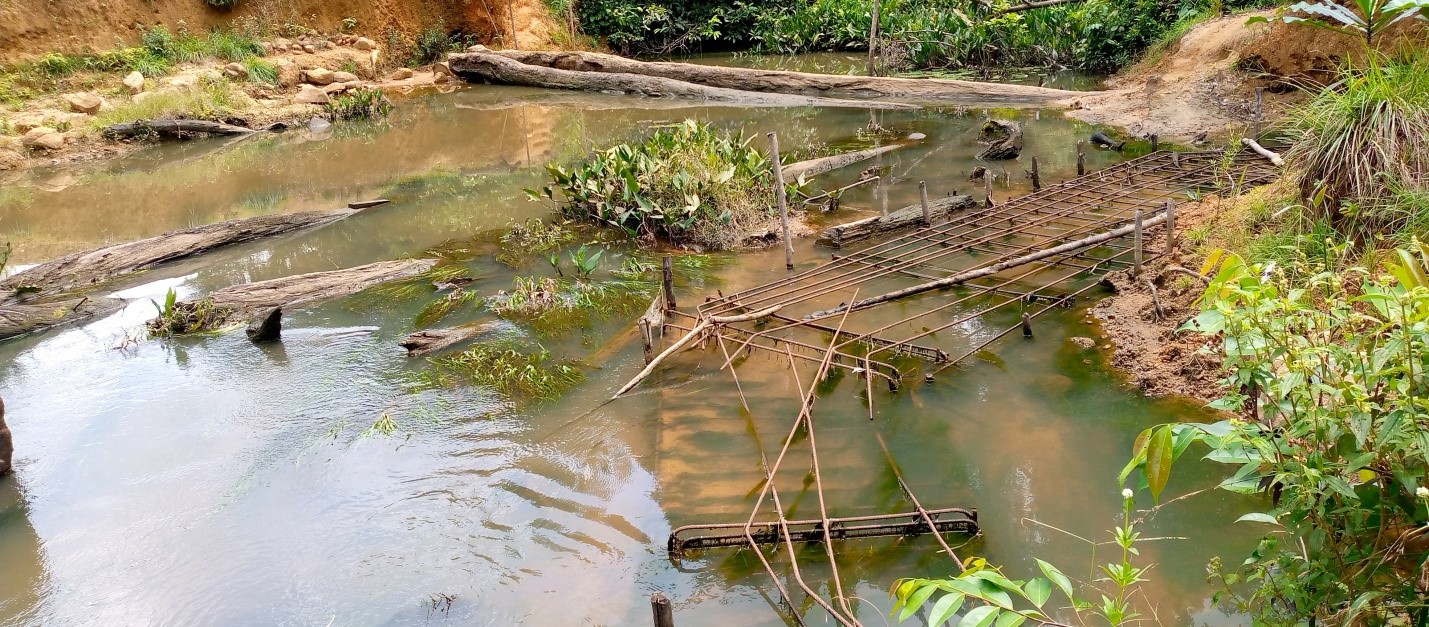
Current status of the Draw River Bridge Project in Zahnflahn Administrative District
This is the Draw River. Located near Zorh Town, River Cess, the river is calm and shallow in the dry. But when the rains come, it deepens and overflows. The community has been bedeviled by this seasonal challenge for many years and has intensely hoped for a lasting solution. The community would take a giant step towards the construction of a bridge but once public officials got involved, politics and corruption surfaced. The Bridge is yet to be.
Meet Comfort Gardehway, a 27-year-old mother of two residing in Wholozohn Clan, Zarflahn Administrative District, River Cess County. Like many of her peers, she worries about her children’s education as the raining season intensifies. According to her, most kids (hers included) are unable to attend school when the Draw River overflows.
She says that when the river overflows during the rains, women in labor often have to wait for days to make the crossing or, alternatively, are carried in hammocks to nearby health facilities. “Some even give birth at the riverside and are attended to by traditional midwives”, she added.
Due to these and many other challenges, the community decided to construct a bridge. Thanks to land rental fees paid by the EJ&J Logging Company for carrying out commercial logging operations in the community forest.
In 2019, the community, through its Community Forestry Development Committee (CFDC), entered an agreement with LIDA (Liberia) Limited for the construction of a bridge valued at One hundred and Six Thousand United States Dollars (US$106,000). Of this amount, Thirty-Five Thousand United States Dollars (US$35,000) was to be provided by the CFDC and the remaining amount was to be sourced from the County Social Development Funds (CSDF) through a County Sitting resolution. The agreement was signed by the CFDC Chairperson Mathew Walley, then Legislative Caucus Chairperson Senator Dallas A.V. Gueh, Project Management Committee Chairperson Romeo Alphonso Kebbeh, Fiscal Affairs Superintendent Cyrus Elijah Kaysaynee and the Chief Executive Officer of LIDA (Liberia) Limited Marshall David Yeanue.
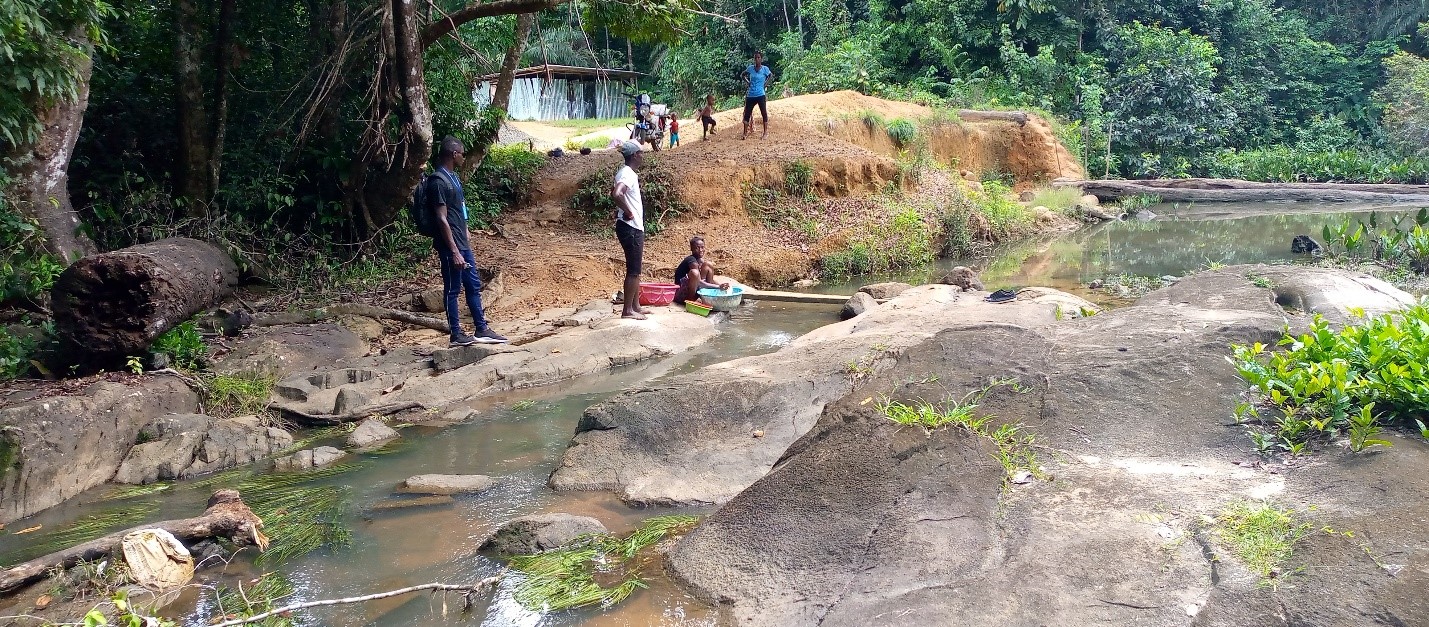
View of the construction site
But two years later, the bridge project has barely begun. This has created a Pandora box as many wonder who is really telling the truth. Accusing fingers have been pointed from one end to another. County officials have said that the contractor (LIDA) brought in substandard materials, something which prompted them to issue a stay order on the construction. On the other hand, the head of the CFDC, Mathew Walley, has attributed the stalemate to the fact that county officials received money from the contractor, coupled with officials’ refusal to disburse the CSDF share of the project cost.
“The Development Superintendent Amos Somah halted the construction work because he said the contractors were using low quality materials, but when we went there for verification, the Development Superintendent only identified the steel rod on grounds that the steel should have been 16mm instead of the 14mm that was used”, Walley of the CDFC said. But Walley himself has been accused of selling materials procured for the project. When confronted, Walley claimed that 100 bags of cement were given out to a business as a safeguard and would be replaced. When quizzed, this is how he responded: “so if we took it out for safety, is that not sufficient? I told you that the business that used it is waiting to replace it. What next will you ask? What I want you to do as an investigative journalist is to find out what is holding the bridge now? Why has the project delayed? What is the responsibility of the parties?”, he responded to our inquiry.
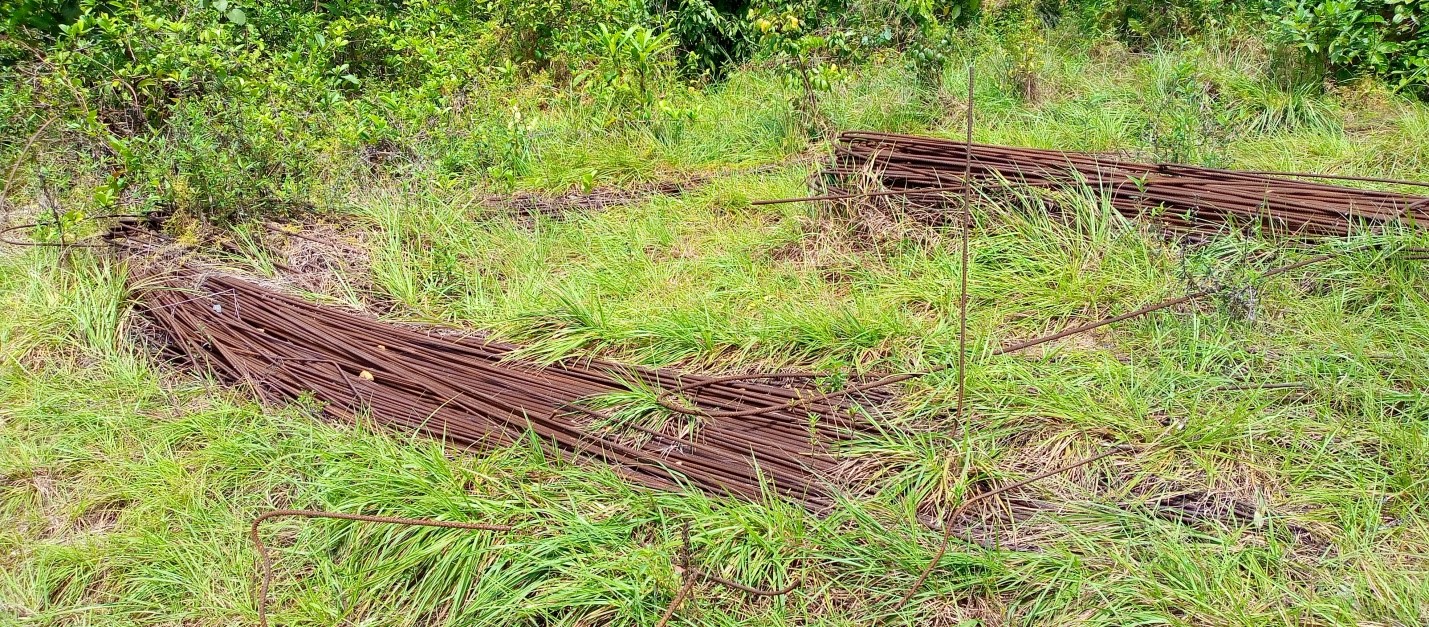
Steel rods brought in by the company lie exposed at the project site
On March 19, 2021 a group under the banner Concerned Citizens Movement of Wholozohn Clan filed a complaint against Mathew Walley, head of the CFDC, to the 14th Judicial Circuit Court for River Cess County demanding answers about why the project has not resumed although materials are available at the project site.
Based on the group’s complaint, the court on April 5, 2021 cited the contractor (LIDA) through its Chief Executive Officer, Mr. Marshall David Yeanue, Mathew Walley of the CFDC and Development Superintendent Amos Somah to appear and show cause why construction works have not resumed. At the hearing, the contractor admitted receiving Thirty-Seven Thousand United States Dollars (37,000.00USD) from the CFDC instead of the initially agreed Thirty-five Thousand United States Dollars (35,000.00USD). The contractor assured the court of resuming work. Strangely, the contractor has recently argued that the contractual agreement placed the project duration at six business months and that since the duration has expired, work would not resume until County authorities compensate for damages encountered as the result of the stay order, which it says lacks technical basis.
A highly placed source who spoke to us on condition of anonymity said the stay order issued by Development Superintendent Amos Somah was motivated by personal interests. According to the source, Somah stopped the construction work because the Bid Evaluation Committee denied a construction firm, which he is linked to, the bridge construction contract. According to the source, Somah was also a member of the Bid Evaluation Committee and had attempted to turn the tide in favor of the company. However, other committee members resisted.
The source also hinted another reason for the inability of County officials to take actions against the seemingly daring contractor. According to the source, the contractor (LIDA) gave Six Thousand United States Dollars (6,000USD) to Development Superintendent Somah and Assistant Fiscal Affairs Superintendent Cyrus Elijah Kaysaynee as “credit” to facilitate holding of the 2019 county sitting. Our investigation also revealed that the money was delivered to the officials by the contractor after the community had made good its share of the cost for the Draw River Bridge Project. The amount was withdrawn from the Forestry Management Committee Area B(FMC-B) account by CFDC Chairperson Matthew Walley and was presented to Fiscal Affairs Superintendent Elijah Kaysaynee and Development Superintendent Amos Somah. A source closed to the transaction said the contractor had earlier told the County Officials that the money he was crediting the county was part of the project fund.
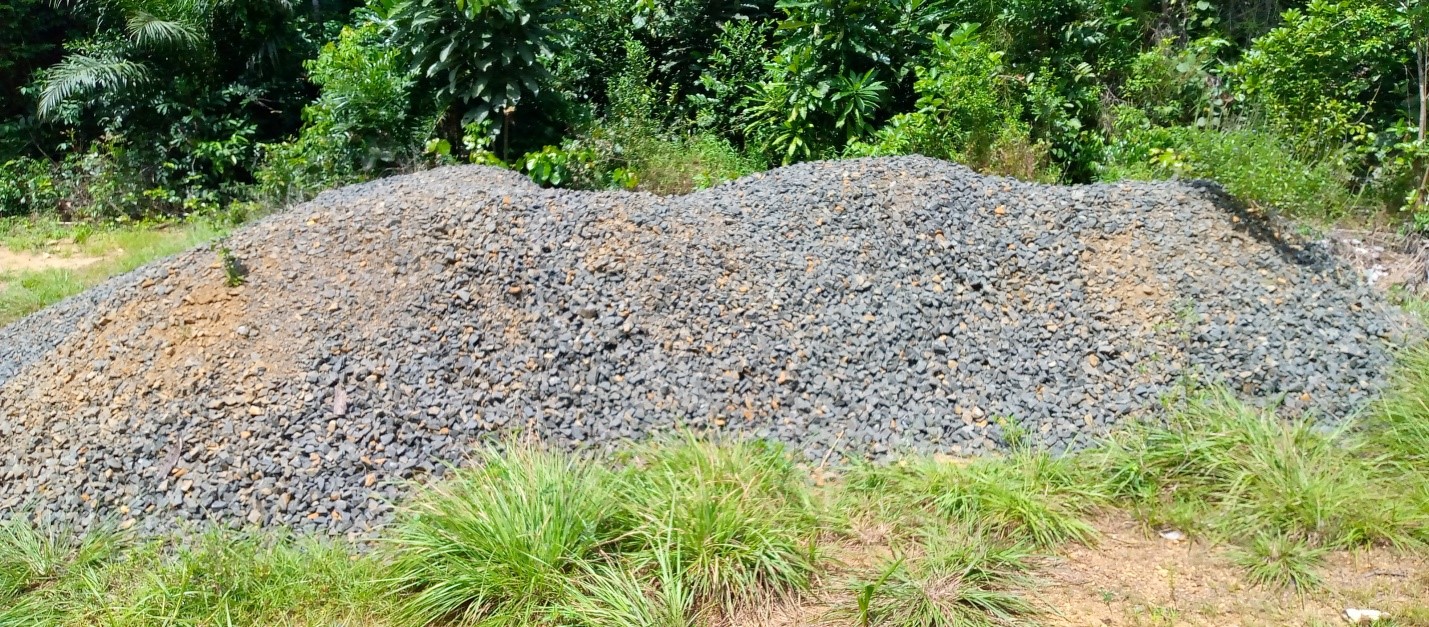
Crushed rocks deposited at the project site
When contacted, Fiscal Affairs Superintendent Elijah Kaysaynee denied receiving any money from the contractor for personal affairs but argued that the county credited money from FMC Area K not Area B.
“We took money from the FMC Area-K; we did not take money directly from Marshall Yeanue, but we took money from the CFDC with an agreement, not with Marshall” he reacted.
Meanwhile, River Cess Project Management Committee (PMC) Chairperson Remeo Alphonso Kebbeh has said that the disbursement of the Thirty-Five Thousand United States Dollars (USD$35,000) was done by the Fiscal Affairs Superintendent Elijah Kaysaynee and the CFDC chairman Mathew Walley without the PMC involvement.
“The Fiscal Affairs [Superintendent] called me before they give the money to the contractor and he came back to River Cess and told me they had the entire transaction document” he explained.
Development Superintendent Amos Somah says the county will not give LIDA a dime to continue the project; adding that neither the county nor the community is obligated to LIDA (Liberia) Limited. He said he halted the project because of the substandard materials and that Mathew Walley and Marshall Yeanue must be held accountable for the failure of the project. Sadly, these materials remain exposed at the project site and stand the risk of theft.
There are many questions that remain unanswered as the Draw River remains a nagging concern for locals. Patriotic sons and daughters of the county are wondering why the contractor (LIDA) alone will challenge the entire county and the leadership remains mute and inert. Aren’t county officials complicit and compromised by their “credit” of funds intended for the project? Is it not the responsibility of government to fund county sittings? Why is the CFDC which manages community forest revenues not taking any action? And why did the CFDC sell over 100 bags of cement intended for the project without the citizens concern? Plus where are the funds from the sale? Are communities being robbed by county officials of the little they have to benefit from extraction of their forest resources? These questions may remain unanswered now but, with growing citizens’ demand for accountability, the answers might just come sooner than expected. Meanwhile, we continue to hope that the Draw River Bridge project delivers an actual bridge rather than a bridge only on paper.
About the Author
Gabriel B. Sawah is a CENTAL Investigative Journalism Fellow and Manager at the Development Communication Network (DCN) Radio in Cestos, River Cess.
Editor: This article was edited by Gerald D. Yeakula, Esq., Program Manager at the Center for Transparency and Accountability in Liberia (CENTAL).
Editor’s Note: This article is made possible through the National Integrity Building and Anti-Corruption (NIBA) program implemented by CENTAL with funding from the Swedish International Development Cooperation Agency (SIDA) through the Embassy of Sweden. The donor has no input in the story and it does not necessarily reflect her views.
CENTAL Lauds President Weah for Submission of Anti-graft Bills …Urges Legislature To Timely Act on Bills Submitted
Press Statement for Immediate Release
The Center for Transparency and Accountability in Liberia (CENTAL) is gladdened over the submission of anti-graft bills by His Excellency President George M. Weah to the Legislature. This is a step in the right direction. CENTAL believes that, when passed into Law, the Bills would further strengthen Liberia’s legal framework regarding anti-corruption by expanding powers of the Liberia Anti-Corruption Commission (LACC) and ensuring the protection of whistleblowers and witnesses. The bills are key to strengthening the independence of the LACC through granting it direct prosecutorial power and providing protection for would-be reporters/whistleblowers (victims and witnesses) of corruption.
It can be recalled that President Weah recently submitted a number of Bills including: the “proposed Act Restating An Act to Establish the Liberia Anti-Corruption Commission,” “the proposed Whistle Blower Act of 2021,” and the “proposed Act amending of Part X, Section 10 of the Code of Conduct of 2014, to grant full authority to the LACC to compile, verify, maintain, and update a comprehensive asset declaration registry for all Government employees with specific sanctions for non-compliance. CENTAL notes that the efforts of the President are a fulfilment of his 2021 State of the Nation Address in which he informed the Honorable National Legislature that the said legislations would be presented to them for action.
Ladies and gentlemen of the Fourth Estate, while CENTAL applauds the great step taken by the President, we are concerned that no bill was submitted by the President for the creation of a dedicated Corruption and Related Financial Offences Court, or CRIMINAL COURT “F” even though its importance was recently highlighted in the President’s Annual Address. We believe that the judiciary has an important role to play in the fight against corruption and as such the need for the creation of a dedicated and specialized/fast-track court for corruption cases must be addressed. This Court is also very critical considering the backlog of cases on the dockets of existing courts. Therefore, CENTAL urges the President to similarly push for establishment of the Corruption and Related Financial Crimes/Offences Court.
We also call on the Legislature to ensure that these proposed anti-corruption instruments are speedily given due consideration. We note that the Whistle-Blower Bill has been lingering in the Legislature for over four (4) years without any action. Legislations critical to curbing the menace of corruption must be given adequate preference and scrutiny if we must succeed as a country. Thus, we call on the Senate and House of Representatives to prioritize these bills and as well involve all stakeholders including, civil society in processes leading to their passage. It is through stakeholders’ engagement through public hearings and other open and participatory processes that good and citizen-centered laws and policies are made.
Finally, we call on media, civil society, ordinary citizens, and development partners to closely follow and constructively engage with the Legislature for timely passage of these Bills and other instruments critical to strengthening the legal framework for promoting and entrenching the culture of accountability, transparency, and integrity in Liberia.
CENTAL Welcomes Supreme Court’s Ruling in Samukai Case; Calls for Speedy Determination of Corruption Cases
Press Statement for Immediate Release
Wednesday, February 10, 2021
Ladies and Gentlemen of the Press, the Center for Transparency and Accountability in Liberia (CENTAL) expresses delight over the Supreme Court ruling affirming the judgment of the First Judicial Circuit Court Criminal Assizes “C” in the case Republic of Liberia v. J. Brownie Samukai et al, holding the Defendants guilty of the crimes of Theft of Property, Criminal Conspiracy, and Misuse of Public Money in respect of funds contributed by men and women of the Armed Forces of Liberia (AFL) towards the AFL Pension Fund.
Members of the Press, fellow citizens, one and all, while we hold that the Court missed an opportunity to call corruption by its name, we are however optimistic about the decision of the Court for the following reasons:
- The Court’s unambiguous exposition of key corruption issues, including its reference to “integrity” and the “universal principle of accountability”. We believe that the Court’s acknowledgment and elaboration of these concepts represent a significant step in mainstreaming the fight against corruption at the highest levels of society as well as entrenching integrity values.
- The Court’s admonition that public officials “must have legal reliance and a legal basis” for the fulfillment of both their “statutory responsibilities as laid down by statute” and their “special duties as commanded by the head of state/president”. Expanding on this point, the Court explained that a public official is required to perform and implement the commander-in-chief/President’s orders with public funds as budgeted by the government in accordance with the government budget process. We are of the opinion that this position by the Court presents a teaching moment to public officials who go to any lengths to endear themselves to the Presidency or any authorized individuals at the expense of our laws and public interest. We further agree with the Court that a Minister or Public Official receiving Presidential orders, whose obedience requires violation of an existing policy or law, has a duty to advise the President or cause the Minister of Justice to advise the President and “that if the President insists on the implementation of the illegal order, the Minister has the option to disobey the President and honorably resign his position with integrity.” While the ruling of the Court references the presidency due to the facts presented by the case under review, we strongly believe that it applies to other public officials and individuals taking instructions from their superiors. This, we believe, sends a very clear message that the utmost duty of public service is the state and its people and not the power-that-be.
We applaud the Court for its decision and further urge it to decide corruption cases with an even higher speed. Appeals to the Supreme Court has long been used to stifle justice, especially in corruption-related cases. The Court must therefore exert all efforts to ensure that cases are speedily determined according to the due process of law, ensuring that the rights of all accused persons are respected and protected.
Distinguished Ladies and Gentlemen of the Press, we would like to use this opportunity to also call on President George M. Weah to timely appoint the Executive Chairperson of the Liberia Anti-Corruption Commission, the government entity leading the fight against corruption in the country. We call for broad-based consultation with civil society, development partners, and other critical stakeholders in processes leading to the recruitment of the next LACC chairperson and officials of other public integrity institutions, including but not limited to the New Auditor General (AG) of the Republic of Liberia. Increased stakeholders’ confidence in those appointed or recruited to key positions of public trust, especially at anti-corruption and integrity institutions is essential to receiving the required moral and financial support as well as cooperation to effectively and efficiently perform.
To conclude, we reiterate our commitment to supporting the fight against corruption in Liberia and overall national integrity building efforts. Also, we call for strong collaboration and partnership between government and other stakeholders, especially ordinary citizens with critical roles in denouncing corruption, demanding accountability from their leaders, as well as providing moral support to public integrity institutions and other key anti-corruption actors.
Thanks.
Management
LOCATION
22nd Street, Sinkor
Tubman Boulevard
Monrovia, Liberia
Phone: +231 88 681 8855
Email: info@cental.org.lr
Website: www.cental.org.lr
SUBSCRIBE
Get updates and important events straight to your inbox. We don't spam

